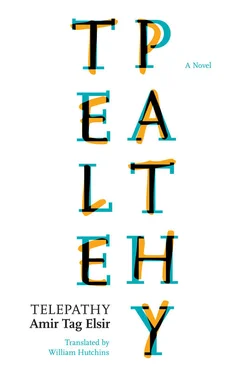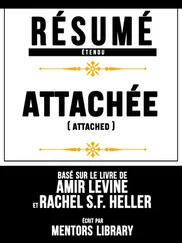That day I didn’t laugh, even though I wanted to laugh till I died. I asked the sadistic, supercilious girl, trying not to anger her, “Why don’t you write it? Aren’t you a writer?”
She replied calmly as her right hand tapped her chest gently, “Of course I could write it, but it wouldn’t enjoy a large circulation, and that’s destined to happen when an established author publishes it. I want you to write it and delegate to me the task of enjoying reading and promoting it.”
“No. . ” I said without thinking, as if the computer on which I write my manuscripts had spoken. “No. . no, I don’t write stories like this.”
That day, when Najma assumed a variety of colorings — primarily anger, indignation, and nervous tension — it seemed to me that she might actually be really captivating and attract many crazed admirers in addition to Tulumba, if her heart were to become more like those of ordinary people and if feelings were inserted into her — not lofty ones — just ordinary emotions.
I watched her hands. Their movements reminded me of a defeated person still struggling valiantly for victory. I observed her eyes a little and discovered that they lacked the limpidity of normal eyes. They seemed to be fitted with contact lenses to shield dark secrets that shouldn’t have light shed on them. She didn’t move from her place but adjusted her posture. She struggled till the hint of a smile found her mouth.
She said with a suavity I did not expect, “You will write it for my sake. Isn’t that so? Every writer offers gifts to girls who are his fans. This will be my gift from you.”
I remembered that she had read me her story “The Neighbors’ Goat” in a corner she had chosen in a noisy coffeehouse that I did not frequent often and that none of my friends patronized. She had paid for my coffee and my cigarettes that day, had listened to my negative opinion of her story, and had left angry, only to return with a dilemma that was hers and not mine.
In my first meeting with her I had probed a lot into her character, more than I should have, but had found no trace of admiration that would prompt me to offer her a text that I could not write. I was certain now that she, even if she had never read a book by me, would understand from my approach to writing that if I did actually write her dilemma as a novel, I wouldn’t elevate her a single centimeter. I would make her the worst heroine ever. Her “lover,” on the other hand, the petition writer Tulumba, I might transform into a crazed lover who would not accept defeat easily. He would bring her to dwell in a house trellised overhead with vipers and furnished with daggers and knives. He would kill her time and again so that he could survive as a firebrand of love, eternally aflame.
Annoyed with her and her insistence on creating a victim, I sided strongly with her suitor just as I had sided previously with numerous individuals I considered victims of an unjust life. I remember that in my novel The Course of Events on the final two pages I saved the hero — Sufyan, an embezzling bank employee — from serving many years in prison because I considered him a victim of a lengthy chain of malfeasance, in which he was merely a minor link, while much more robust links were watching his tragedy and laughing.
In the novel Tortoise , published five years ago, I watched Salma, a cruel, perverted public security officer who devised innovative forms of sexual torture, die on the last page; but then I invented an effective remedy that extended her life long enough to give her time to apologize repeatedly to her victims before she expired.
I said to Najma, “My dear, I don’t owe anyone anything. I’m a free writer and write only what I want and what I can. The experiences of other people don’t appeal to me or excite me.”
I think I was rude, because I felt wasted and had a bitter taste in my throat. I saw the supercilious girl vanquished this time so decisively that she made no attempt to inch toward victory.
She plucked her classic gray handbag from the table, opened it forcefully, and took out a strip of aspirins. She popped two pills from the strip and swallowed them without water. Then she rose and turned away from me.
She departed with quick steps, much faster than a girl’s ordinary gait. The adolescent waiter, whose smile revealed teeth corroded by sweets, had, I suspect, a different scenario — involving love and the flight of the beloved — playing in his mind at that moment. When I returned to my house that day, I sat brooding deeply about the petition writer Hamid Abbas, reflecting on his nickname Tulumba — “the Pump” — and how he had acquired it. This chain of thought was far removed from Najma’s dilemma and was a line of reasoning that might introduce this crazed lover to a different text far removed from his actual life.
Najma did not meet with me again for a long time after that — just as she hadn’t after I criticized “The Neighbors’ Goat”. So I was surprised to receive, approximately a year later, on Facebook, a request to be her friend. I responded quickly and did not resist my desire to check out her wall to learn what types of projects she was working on, whether she was still writing short stories, and whether her skills had improved.
I found the story “The Neighbors’ Goat” plastered across the page, with all its linguistic and technical flaws. There were hundreds of comments and expressions of admiration surrounding it, promoting its flaws.
I discovered another story by her, called “Espionage Report on My Grandmother”. The idea was excellent, but the writing wasn’t. The best thing about the story was its title. There were also other brief phrases that did not match her personality, like: “My heart burgeoned in your flank. Straying in your feelings, it rises, soaring. . I beg you,” or “If my desire to meet you dies, don’t forget to visit its grave.”
I placed a “like” sign on a picture of her in dark clothing and without accessories, leaning against a mud-brick wall, apparently in some village or country estate, even though I didn’t actually like the picture. This “like” opened a passageway in the wall of our quarrel and we met once again.
When we met, I intended to ask her about Tulumba, the wretched petition writer — whether he still was madly in love with her and was creating scenes for her immortal novel. But I didn’t, for fear of becoming involved in her crisis again. She, for her part, gave me no information about what had happened. She also did not refer on her page to that dilemma, which she had said she was trying her hardest to drag out as long as possible.
I answered Najma’s phone call after a number of insistent rings.
She spoke in a very low voice, as if she were too good for the line and did not want to release her voice full force. She apologized for not attending the book launch for Hunger’s Hopes , citing an unexpected illness of her normally healthy grandmother, who was over ninety, and enthusiastically invited me to attend an enlightening debate to be held the next evening at the Social Harmony Club, where she would introduce the speaker. The lecture would be devoted to something called “reflexology medicine”, about which there was currently a lot of talk. “People have a right to understand its reality from the experts, in person, and the degree to which it can alleviate pains and treat chronic illnesses,” she said.
Despite my serious efforts to acquire information and despite the fact that I have expended endless hours reading books of every type, all I knew about reflexology was the name, and it had never occurred to me to learn about it firsthand. The topic had never interested me much, and I had no wish to seek treatment, should I get sick, from any alternative form of medicine. The invitation was delivered persistently, however, by a girl who had been humiliated by me often; I had to go, to humor her.
Читать дальше












